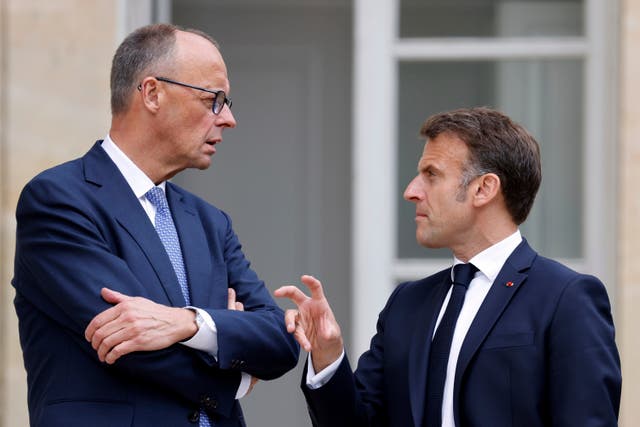New German government plans to boost border controls to curb migration
The country’s new Chancellor Friedrich Merz had vowed to toughen the country’s migration policy during his election campaign.

Germany’s new government plans to station more police at the border to curb illegal migration and even turn away some of the asylum seekers trying to enter Europe’s biggest economy, the new interior minister said on Wednesday.
Alexander Dobrindt told reporters in Berlin that police at the border would be increased in coming days.
He said vulnerable people would still be allowed to enter, but his assertion that Germany would turn away some asylum seekers goes beyond what the previous government was willing to do.
“We are not going to close the borders, but we are going to control the borders more strictly and this stronger control of the borders will also lead to a higher number of rejections,” Mr Dobrindt said.
“We will gradually increase this higher number of rejections and the stronger controls at the borders,” he added.
“We will ensure that, step by step, more police forces are deployed at the borders and can also carry out these push-backs.”
The country’s new Chancellor Friedrich Merz had vowed to toughen the country’s migration policy during his election campaign.
Just weeks before the national election in February, the conservative leader said he would bar people from entering the country without proper papers and to step up deportations if he is elected chancellor.
Those comments came after a knife attack in Aschaffenburg by a rejected asylum seeker, which left a man and a two-year-old boy dead.
Mr Merz succeeds former chancellor Olaf Scholz, whose government collapsed six months ago. Mr Merz was elected by MPs on Tuesday and officially nominated as chancellor by the country’s president the same day.
Mr Scholz, too, had been under pressure to curb migration as shelters across the country had been filling up for years.
His government tried to speed up asylum procedures and also negotiated agreements for countries to take unsuccessful asylum seekers back in exchange for more opportunities for legal immigration.
In February, just days before the election, Mr Scholz’s government had also extended by six months the border checks it imposed on all its frontiers last autumn as it attempted to cut the number of migrants arriving in the country.
The government said at the time that the increase of border controls led to a drop in migrants trying to cross Germany’s borders.
The European Union’s visa-free travel area known as Schengen allows citizens of most member states to travel easily across borders for work and pleasure. Switzerland also belongs to Schengen although it is not an EU member.
According to the EU, member states are allowed to temporarily reintroduce border controls in cases of a serious threat, such as internal security. But it also says border controls should be applied as a last resort in exceptional situations, and must be limited in time.
“We want this Europe of open borders to be possible again, but the current situation is one of open dysfunctionality,” Mr Dobrindt said.
“This must be corrected and then we can very quickly return to a reduction in border controls.”
Germany’s anti-immigrant, far-right Alternative for Germany party, or AfD, had also campaigned on the migration issue with calls for deportations of “illegal immigrants”.
Last week, Germany’s domestic intelligence service classified the AfD, which came second in national elections in February, as a “right-wing extremist” organisation — making it subject to greater and broader surveillance of its activities.
The agency described the AfD as a threat to the country’s democratic order, saying it “disregards human dignity” — in particular by what it called “ongoing agitation” against refugees and migrants.
According to the EU’s border control agency Frontex, the number of irregular border crossings into the European Union fell significantly in 2024.
In Germany, the number of people applying for asylum fell sharply last year. The Federal Office for Migration and Refugees says 250,945 people applied for asylum in 2024, down 30.2% from 2023.
Mr Merz plunged straight into international crises on his first full day as Germany’s new chancellor on Wednesday, presenting a united front with France against U.S. President Donald Trump’s trade war, demanding more aid for Gaza and announcing he soon would visit Ukraine.

Mr Merz and French President Emmanuel Macron – firm believers in the European Union and leaders of the continent’s largest economies – used their first meeting since the German leader’s appointment on Tuesday to show unity on Ukraine and other issues causing alarm in Europe.
They vowed to strengthen the continent’s security and increase defence spending.
In a joint news conference, Mr Merz acknowledged that Europe still needs the US for peace in Ukraine.
“It is our firm conviction that we cannot end this war in Ukraine without further political and military engagement by the United States of America,” he said. “The Europeans cannot replace this at present.”
During the meeting in Paris, Mr Macron said that France and Germany will “accelerate” defence co-operation, including jointly developing new defence technologies “necessary for the wars of tomorrow”.
He listed working together on tanks, long-range missiles and combat aircraft. He also said that the countries would start regular meetings of a French-German defence council.
Mr Merz also visited Poland on Wednesday and addressed his new government’s plans to station more police at Germany’s border to curb illegal migration.





